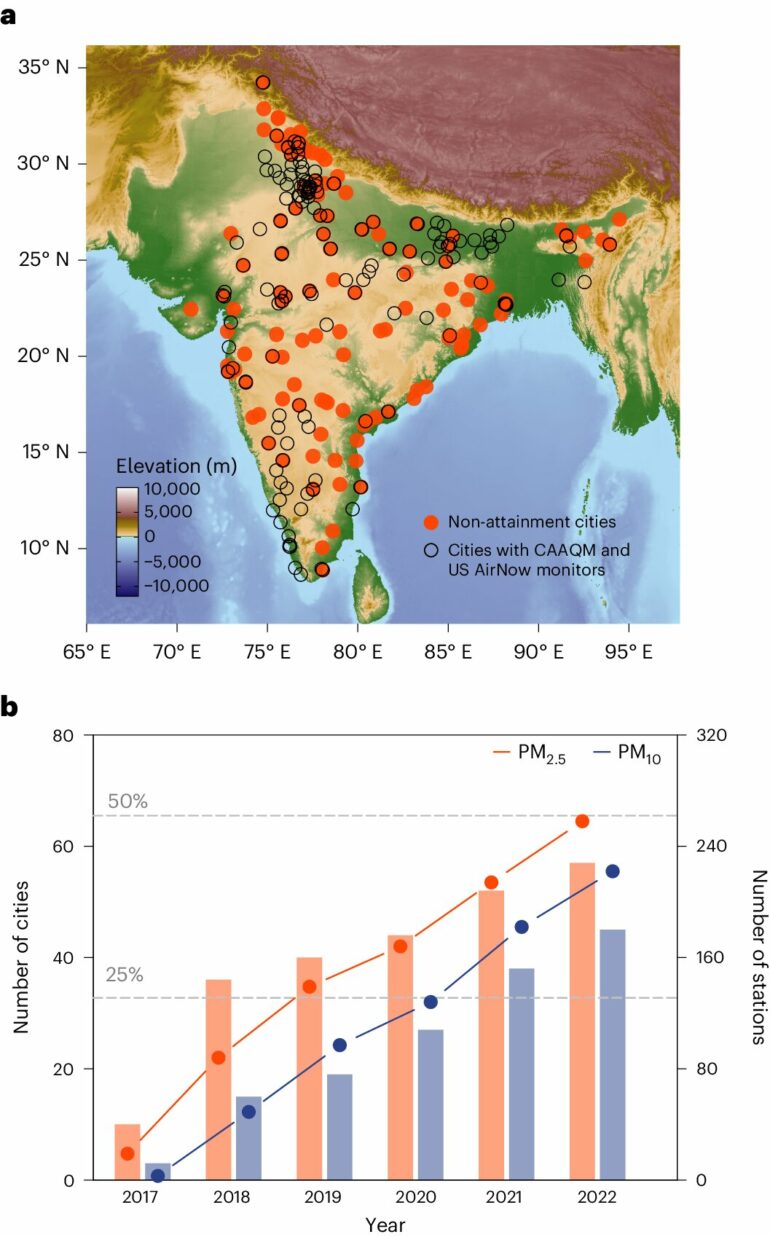A significant portion of recent improvements in air quality in India resulted from favorable meteorological conditions that are unlikely to persist as the climate changes, a new study has found.
Rapid industrialization and population growth have led to significant increases in emissions and air pollution to dangerous levels in India. To address this challenge, the Indian government implemented the National Clean Air Programme (NCAP) to reduce emissions of fine particulate air pollutants (particulate matter with diameters less than 2.5 microns (PM2.5) and 10 microns (PM10) and their precursors) in cities which fail to meet the Indian air quality standards (i.e., non-attainment cities).
Though cities have seen noticeable decreases in fine particulate concentrations since the implementation of the program, most of the improvements were as a result of weather conditions, according to a Princeton University-led study published in Nature Sustainability.
Dr. Kieran Hunt, of the University of Reading, is a co-author of the study. He said, “While air quality in Indian cities has improved since 2017, a significant portion of this improvement is due to favorable weather conditions rather than solely policy efforts.”
These weather patterns are known as “western disturbances,” a type of winter storm common over north India. As they arrive, they bring surface winds which ventilate the cities, blowing pollution into less populated areas, as well as rainfall which cleans the air by absorbing pollutants as it falls.
Dr. Hunt added, “We found about 30% of the reduction in PM2.5 pollution can be attributed to meteorology. This is concerning because these favorable weather patterns may not persist as the climate changes.
“Despite some progress, many cities still don’t meet air quality standards. Our findings underscore the urgent need for more aggressive pollution control measures, particularly those that address both air pollution and climate change, such as transitioning to renewable energy and reducing agricultural waste burning.”
Mixed results
In 2019, India’s Ministry of Environment, Forest, and Climate Change launched a plan to reduce air pollution by 20-30% by 2024, compared to 2017 levels. The Princeton study examined the plan’s effectiveness in six cities.
The results showed an 8.8% yearly decrease in fine particle pollution (PM2.5) from 2017 to 2022. Four of the six cities met the target, achieving over 20% reductions. However, the study revealed that about 30% of the air quality improvements were due to favorable weather conditions rather than policy changes. This figure rose to 50% during winter months.
The researchers used surface measurements and computer models to separate the effects of weather from those of emission changes. They found that while primary PM2.5 emissions decreased, emissions of other pollutants that contribute to PM2.5 formation haven’t decreased and have even increased in some areas since 2017.
Despite the improvements, 44 out of 57 cities still failed to meet national air quality standards in 2022.
Dr. Yuanyu Xie, an associate research scholar at Center for Policy Research on Energy and the Environment and lead author of the study, said, “Decreasing pollution concentrations are beneficial for public health. However, if these improvements are not primarily driven by substantial emission reductions, the current air quality improvements may not be sustainable. Increasing emissions of PM2.5 precursors we found could also indicate that existing policies are either ineffective or have not been fully implemented and enforced.”
More information:
Yuanyu Xie et al, Recent PM2.5 air quality improvements in India benefited from meteorological variation, Nature Sustainability (2024). DOI: 10.1038/s41893-024-01366-y
Provided by
University of Reading
Citation:
Air quality improvements in India partially due to weather, study finds (2024, July 24)



